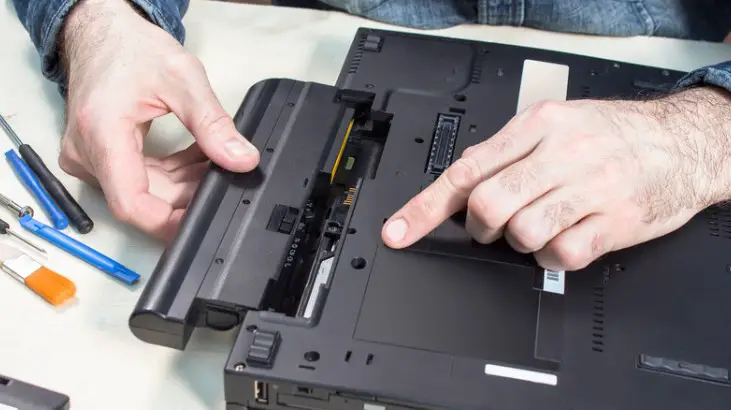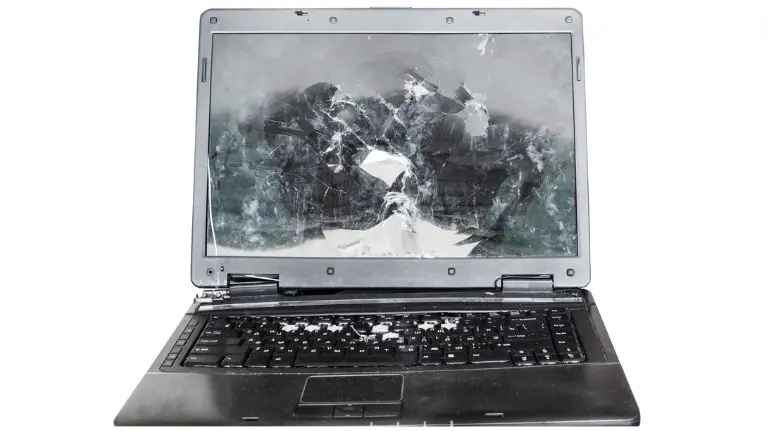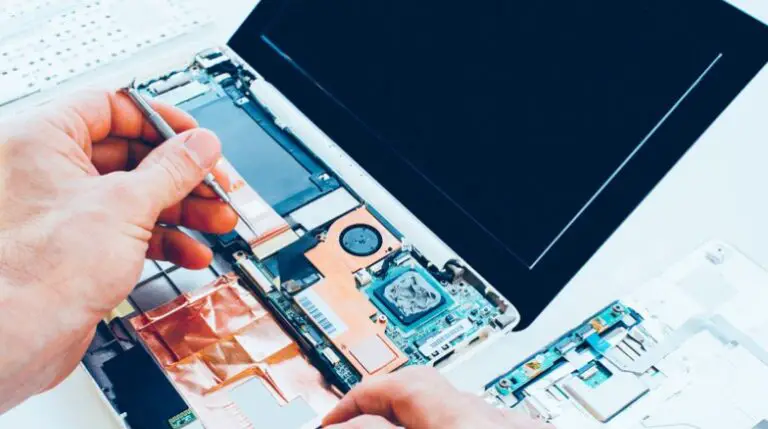Does Removing Laptop Battery Delete Data?
You’ve heard the saying, ‘don’t throw the baby out with the bathwater,’ right?
Well, when it comes to removing your laptop battery, you might wonder if you’re throwing out more than just a power source.
The question of whether or not removing your laptop battery deletes data is one that has been asked time and time again. And for good reason. Your laptop holds important information – from personal photos to work documents – and losing any of it can be devastating.
In this article, we’ll dive into the function of a laptop battery and how it relates to data preservation. We’ll explore what happens when you remove your battery and how it affects your files.
We’ll also discuss best practices for shutting down your computer before removing the battery and what to do if you experience a battery failure.
By the end of this article, you’ll have a clearer understanding of whether or not removing your laptop battery puts your data at risk and how you can protect yourself from potential loss.
The Function of a Laptop Battery
The laptop battery is responsible for powering the device and plays a crucial role in preserving important information.
When you remove the laptop battery, it can affect your data in several ways. Firstly, without power, your computer will shut down immediately and you risk losing any unsaved work or open files. Secondly, removing the battery can cause a power surge that could damage components inside the laptop.
To avoid permanent data loss or damaging your hardware when removing the battery, it’s essential to practice good battery health maintenance. Ensure that you keep an eye on your laptop’s battery lifespan by checking its charge level regularly and taking steps to extend its life where possible.
Additionally, always safely shut down your computer before removing its battery to prevent sudden power surges that could harm internal components such as hard drives or motherboards.
Hard Drive Storage and Data Preservation
If you want to save your precious files and memories, it’s always better to be safe than sorry by taking some precautionary measures like backing up your data on an external drive or cloud storage.
However, removing the laptop battery doesn’t necessarily delete any data from the hard drive. It’s just a power source that keeps the laptop running when there is no electrical outlet available.
To ensure proper data preservation techniques and hard drive maintenance tips, here are some things you should keep in mind:
- Always backup your important files before making any changes to your computer system.
- Use a reliable anti-virus software to protect yourself from malware and viruses that can corrupt or erase your files.
- Keep your operating system updated with the latest patches and security updates.
- Regularly run disk cleanup and defragmentation tools to optimize performance and prevent data loss due to file fragmentation.
By following these simple steps, you can make sure that your valuable information stays safe even if something unexpected happens with your laptop battery.
Remember that prevention is always better than cure when it comes to protecting your digital assets.
Battery Removal and Power Supply
When you remove the power supply from your laptop, it’s crucial to understand the implications it may have on your files and system performance. While removing the battery won’t delete any data, it can cause certain programs or processes to malfunction due to sudden loss of power.
Additionally, if your laptop’s battery lifespan is already low and needs replacement, removing it will limit your ability to work without a constant power source.
Moreover, when you decide to remove the battery from your laptop, keep in mind that not all power adapters are compatible with every model. Using an incompatible adapter can damage both your device and the adapter itself.
Make sure to check the specifications before purchasing a new one or using one that isn’t yours. By doing so, you’ll ensure proper voltage and wattage levels are met for safe usage of your device while avoiding any potential harm caused by an incompatible adapter.
Shutting Down Your Laptop Properly
Before shutting down your device, it’s essential to ensure all programs and files are saved properly to avoid any potential loss. This means closing out of any open applications and saving any unsaved work. Failure to do so could result in data corruption or loss, especially if the laptop is shut down abruptly.
To properly shut down your laptop, click on the start menu and select the ‘power’ option. From there, choose ‘shut down,’ and wait for your device to completely power off before removing the battery.
It’s important to note that removing the battery while your laptop is still running could cause damage to both your battery and device. By following these proper shutdown procedures, you can help ensure that your data remains safe and secure even when removing the battery from your laptop.
Battery Removal During File Transfers
You might be feeling anxious about interrupting a file transfer by removing the battery from your device. It’s natural to worry about losing valuable data when you suddenly cut off power to your laptop.
Fortunately, removing the battery during file transfers is unlikely to cause any major issues with file integrity or data corruption. When you remove the battery from your laptop while transferring files, your device will typically shut down immediately. The operating system and applications running on your computer will stop working as well.
However, most modern laptops have built-in mechanisms that ensure data is saved before shutting down completely. This means that even if you remove the battery during a transfer, the files being transferred are likely to remain intact and undamaged.
Battery Removal During Software Installation
Did you know that interrupting a software installation by removing the battery from your device can cause serious issues, with some studies showing up to 70% of installations failing as a result?
Not only does this disrupt the software maintenance process, but it can also lead to potential data safety concerns. When you remove the battery during an installation, there’s a chance that the software may not be properly installed and could lead to corrupted files or system crashes.
To avoid these issues, it’s important to ensure that your device has enough battery life before starting any software installation. If you’re unsure how much battery life you have left, try plugging in your device while installing the program.
Additionally, here are three tips for ensuring successful software installations:
1) Close all unnecessary programs and applications before beginning the installation process.
2) Use reputable sources when downloading software to avoid malware or other harmful programs.
3) Don’t interrupt or stop the installation process once it begins.
By following these guidelines, you can help ensure that your device stays safe and runs smoothly after installing new software.
Battery Removal During Software Updates
Interrupting a software update by pulling out your device’s battery can cause serious problems and potentially harm your device. In the worst-case scenario, you could end up with data corruption or brick your device entirely.
Firmware updates are particularly vulnerable to interruptions, as they involve low-level changes to how your device operates.
When you start a software update, it’s important to make sure that your device has enough battery life to complete the process. If you’re worried about running out of power during an update, plug in your laptop or connect it to an external power source before beginning the installation.
And if for some reason you need to interrupt the update process, follow the manufacturer’s instructions carefully and be prepared for potential consequences. By taking these precautions, you can minimize the risk of losing important data or causing damage to your device due to battery removal during a software update.
Battery Removal During System Restarts
When your device unexpectedly shuts down during a system restart, it can be frustrating and anxiety-inducing as you worry about potential damage or loss of important information. However, if you remove the laptop battery during a system restart, it’s highly unlikely that your data will be deleted.
The primary impact on hardware from removing the battery during a system restart is that it may decrease the battery life expectancy over time.
Here are three things to keep in mind when removing the laptop battery during a system restart:
- Always make sure to properly shut down your device before removing the battery.
- Be careful when handling the battery and make sure not to touch any of its exposed wiring or connectors.
- Consider investing in an uninterrupted power supply (UPS) for your laptop to avoid sudden power outages and protect against data loss.
Battery Removal During Operating System Upgrades
Upgrading your OS with the battery in place is crucial to avoid any potential hardware malfunctions or damage that could occur from removing it mid-upgrade. Removing your laptop battery during an operating system upgrade could cause your computer to shut down unexpectedly, which may lead to issues like data loss and corruption.
Operating system upgrades are complex processes that involve altering critical files and configurations, so it’s important to ensure that all power sources remain stable throughout the entire process. Furthermore, removing the battery during an OS upgrade can also disrupt the flow of data between various components of your computer, leading to further complications.
Your computer relies on a steady source of power to keep all its internal components working properly, including the hard drive where all your data is stored. If you remove the battery while upgrading your OS, there’s a chance that some critical files may not be saved correctly or become corrupted due to sudden power loss.
Overall, keeping your laptop battery in place throughout an operating system upgrade helps maintain data security and ensures a smooth transition between old and new software versions.
Battery Failure and Data Loss
If your laptop battery fails during an OS upgrade, all the important files and configurations that make up your computer’s software could vanish in an instant. Battery failure is one of the most common reasons why data loss occurs.
This is because when a battery fails, it can cause problems with the laptop’s power supply, which can result in data corruption or loss. Battery lifespan is another factor to consider when it comes to protecting your data.
If you continue to use a laptop with a failing battery, you risk losing valuable information that cannot be recovered. It’s essential to replace your battery as soon as possible if you notice any signs of failure, such as decreased performance or shortened lifespan.
By doing so, you can ensure that your data remains secure and accessible for years to come.
Backing Up Your Data
Backing up your data is crucial to ensure that you don’t lose any important information in the event of a technological mishap.
It’s easy to assume that your laptop will always function as intended, but accidents can and do happen. Whether it’s due to battery failure or other issues, losing valuable data can be a nightmare scenario for anyone.
Thankfully, there are plenty of data backup methods available to help keep your information safe. One popular option is cloud storage. This involves uploading your files and folders to an online server hosted by a third-party provider such as Google Drive, Dropbox, or iCloud.
Cloud storage offers several advantages over physical backups such as external hard drives or USBs; it allows you to access your files from anywhere with an internet connection and provides an additional layer of security against theft or damage to physical devices. Other backup options include backing up your files onto CDs or DVDs, using an external hard drive, or utilizing specialized backup software.
Regardless of the method chosen, taking the time to regularly back up your data is essential for protecting yourself against potential loss in the future.
Final Thoughts on Laptop Battery Removal and Data Security
Ensuring the safety and security of your valuable information is imperative, so it’s crucial to consider these final thoughts on the topic of laptop battery removal and data protection.
While removing the laptop battery does not delete any data on its own, there are still risks associated with laptop theft and data security that should be taken into account.
It is always recommended to backup your important files regularly to an external hard drive or cloud storage service. This way, even if your laptop is stolen or damaged beyond repair, you will still have access to your data.
Additionally, it’s important to take steps to secure your laptop itself from unauthorized access. This can include setting a strong password or using biometric authentication methods such as fingerprint scanners or facial recognition software.
You should also keep your operating system and antivirus software up-to-date to protect against any potential vulnerabilities.
By taking these precautions, you can help ensure that even if someone gains physical access to your laptop, they won’t be able to easily access your sensitive information.
Frequently Asked Questions
Can removing a laptop battery prevent data loss due to power surges?
Are you worried about losing your data due to power surges?
One solution is battery-free laptops, which rely on external power sources instead of built-in batteries. This can prevent the risk of data loss caused by battery failure or leakage.
In addition, there are also laptop models that come with built-in power surge protection, which can safeguard your device and prevent data loss in case of electrical fluctuations. By investing in a laptop with such features, you can ensure that your data is safe and secure even in unexpected situations.
How long should I wait after shutting down my laptop before removing the battery?
When it comes to laptop maintenance, battery replacement is an essential aspect that can prolong the lifespan of your device.
If you’re wondering how long you should wait after shutting down your laptop before removing the battery, it’s crucial to know that there is no one-size-fits-all answer.
However, as a general rule of thumb, you should wait for at least 15-20 minutes after shutting down your laptop before removing the battery. This waiting period ensures that all components have cooled down and are safe to handle.
Additionally, regular battery replacement can prevent unexpected shutdowns and improve overall performance.
So, if you want to keep your laptop in top shape, don’t forget about proper battery maintenance.
Is it safe to remove the battery while the laptop is in sleep mode?
To ensure battery safety, it’s best to avoid removing the battery while your laptop is in sleep mode. Doing so can potentially damage both the laptop and the battery itself. While this may seem like a quick and easy way to swap out batteries or save energy, in sleep mode, your laptop is still running on low power. Any sudden removal of the battery can cause data loss or even hardware malfunction.
Instead, take a few extra seconds to properly shut down your laptop before removing or replacing the battery. This will not only keep your data safe but also extend the lifespan of your device by avoiding unnecessary wear and tear on its components.
What precautions can I take to prevent data loss during a battery replacement?
You’re about to replace your laptop battery and the last thing you want is to lose all of your precious data. Before removing the battery, it’s important to take some precautions to prevent data loss.
First and foremost, make sure you have a recent backup of all your important files stored on an external hard drive or in the cloud. This will ensure that even if something goes wrong during the battery replacement process, your data will still be safe.
Additionally, consider seeking professional assistance from a technician who can guide you through the process and minimize any potential risks. By taking these steps, you can rest assured that your valuable data will remain secure throughout the battery replacement process.
Will removing the battery affect the lifespan of my laptop’s hard drive?
When it comes to replacing your laptop battery, you may be wondering if it will affect the lifespan of your hard drive. The answer is no, removing the battery shouldn’t have any impact on your laptop’s storage capacity or the longevity of your hard drive.
However, it’s important to take precautions during a battery replacement to prevent data loss. Make sure to back up all of your important files before beginning the replacement process and handle the hardware with care to avoid damaging any components.
By following these steps, you can ensure a successful battery replacement without putting your data at risk.
Also read: How to extend the Battery life of your laptop
Conclusion
In conclusion, removing your laptop battery does not delete your data. However, it’s important to understand the function of your laptop battery and how it plays a role in preserving your data.
Hard drive storage is where all of your important files are kept, and proper shutdown procedures should be followed to ensure that they’re not lost. While removing the battery during file transfers or operating system upgrades may pose a risk, backing up your data can provide added security.
Remember to always shut down your laptop properly and consider investing in an uninterrupted power supply (UPS) for added protection against unexpected power outages. So, whether you’re on-the-go or at home, take care of your laptop’s battery and keep those precious files secure.








One Comment